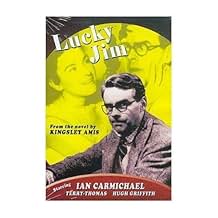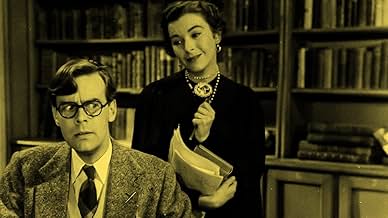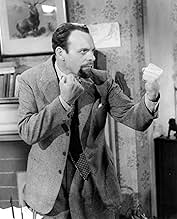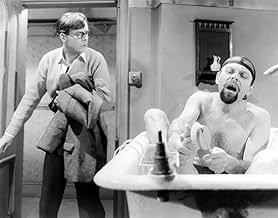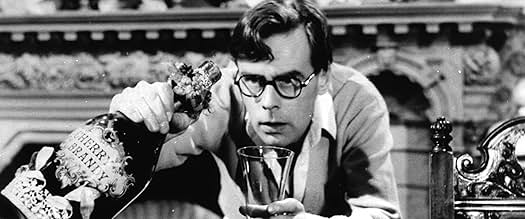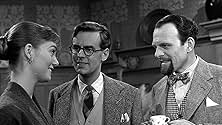Adicionar um enredo no seu idiomaJim Dixon struggles with university work, Professor Welch's boring behavior, and his neurotic friend Margaret Peel. His misery is further complicated by his son Bertrand and companion Christ... Ler tudoJim Dixon struggles with university work, Professor Welch's boring behavior, and his neurotic friend Margaret Peel. His misery is further complicated by his son Bertrand and companion Christine Callaghan.Jim Dixon struggles with university work, Professor Welch's boring behavior, and his neurotic friend Margaret Peel. His misery is further complicated by his son Bertrand and companion Christine Callaghan.
John Welsh
- The Principal
- (as John Welch)
Henry B. Longhurst
- Professor Hutchinson
- (as Henry Longhurst)
- Direção
- Roteiristas
- Elenco e equipe completos
- Produção, bilheteria e muito mais no IMDbPro
Enredo
Você sabia?
- CuriosidadesAt 46 Terry-Thomas was a year older than Hugh Griffith, who played his father. Jean Anderson, playing his mother, was only 4 years older than Thomas.
- Erros de gravaçãoThe taxi used by Jim and Christine when leaving the ball has 'Taxi' on a paper sign in the windscreen which is not there in long shot.
- Cenas durante ou pós-créditosOpening credits prologue: A Redbrick University in Britain's new Elizabethan age: here are moulded the intellectual Drakes and Raleighs of tomorrow - fearless, independent - and state supported
- ConexõesReferenced in The Bill: Lucky Jim (1999)
Avaliação em destaque
Kingsley Amis's first and best novel drew much satirical thrust from its evocation of the late 1940s, when British idealism about the socialist government elected in the first flush of World War Two victory was petering out. The ex-communist university lecturer Amis's ambiguity about putting The People in charge- later expressed in a vehement rejection of educational egalitarianism- is already implicit in this campus chronicle.
The Boulting Brothers, themselves on the left, worked "Lucky Jim" into the mildly satirical cycle of movies which made them the main successors to Ealing in the 1950s and early 1960s. But by updating it to the present and filling it with their rep company of character actors, they lost the plot.
Written by the newspaper humorist Patrick Campbell, this picturisation skates over the hypocrisy of Professor Welch and his clan as moneyed leftists-- an early depiction of limousine liberalism-- and concentrates on slapstick. Ian Carmichael, whose northern accent comes and goes, is too posh to play a grammar school lad who has blundered into the wrong profession. Terry-Thomas is too old and too T-T ("extra-ordinary fellah!") for Bertrand Welch, the spoilt son-- and why make him a novelist rather than a painter, when visual fun could have been had with his awful daubs to make up for the absence of Amis's authorial voice?
Most of the novel's heft comes from the gap between Jim Dixon's forced toadying and his secret derision, expressed in making faces and fantasising elaborate practical jokes. Little of this can get through in a script which majors on pratfalls and all-too-Britishly endorses Jim as the good guy by having the Welch's dog adopt him. And the provincial campus is too grand for the era of austerity and demobbed students Amis imagined, as though the Boultings secretly hankered to relocate the tale to Oxbridge.
All that said, there are incidental pleasures. Hugh Griffiths is spot-on as "Neddy" Welch, as is his namesake Kenneth as the creepy Evan Johns. Unexpectedly, given the initial compromises, the denouement (which was slapstick in the book too) gets closer to Amis's acrid eloquence, although drunks on screen become tiresome faster than directors realise. Interestingly in view of Amis's later problems with American publishers, the Boultings tone down the novel's misogyny. Margaret Peel is less neurotic, predatory and manipulative in the film. Jim's love object Christine, alas, is a tittering cipher on both page and screen. The British cinema wasn't doing sex in the Fifties unless it was "exposing" tarts in Soho.
The Boulting Brothers, themselves on the left, worked "Lucky Jim" into the mildly satirical cycle of movies which made them the main successors to Ealing in the 1950s and early 1960s. But by updating it to the present and filling it with their rep company of character actors, they lost the plot.
Written by the newspaper humorist Patrick Campbell, this picturisation skates over the hypocrisy of Professor Welch and his clan as moneyed leftists-- an early depiction of limousine liberalism-- and concentrates on slapstick. Ian Carmichael, whose northern accent comes and goes, is too posh to play a grammar school lad who has blundered into the wrong profession. Terry-Thomas is too old and too T-T ("extra-ordinary fellah!") for Bertrand Welch, the spoilt son-- and why make him a novelist rather than a painter, when visual fun could have been had with his awful daubs to make up for the absence of Amis's authorial voice?
Most of the novel's heft comes from the gap between Jim Dixon's forced toadying and his secret derision, expressed in making faces and fantasising elaborate practical jokes. Little of this can get through in a script which majors on pratfalls and all-too-Britishly endorses Jim as the good guy by having the Welch's dog adopt him. And the provincial campus is too grand for the era of austerity and demobbed students Amis imagined, as though the Boultings secretly hankered to relocate the tale to Oxbridge.
All that said, there are incidental pleasures. Hugh Griffiths is spot-on as "Neddy" Welch, as is his namesake Kenneth as the creepy Evan Johns. Unexpectedly, given the initial compromises, the denouement (which was slapstick in the book too) gets closer to Amis's acrid eloquence, although drunks on screen become tiresome faster than directors realise. Interestingly in view of Amis's later problems with American publishers, the Boultings tone down the novel's misogyny. Margaret Peel is less neurotic, predatory and manipulative in the film. Jim's love object Christine, alas, is a tittering cipher on both page and screen. The British cinema wasn't doing sex in the Fifties unless it was "exposing" tarts in Soho.
- Oct
- 1 de set. de 2004
- Link permanente
Principais escolhas
Faça login para avaliar e ver a lista de recomendações personalizadas
- How long is Lucky Jim?Fornecido pela Alexa
Detalhes
- Data de lançamento
- País de origem
- Idioma
- Também conhecido como
- Volltreffer ins Glück
- Locações de filme
- The Royal Masonic School, Bushey, Hertfordshire, Inglaterra, Reino Unido(red-brick university where Jim works)
- Empresas de produção
- Consulte mais créditos da empresa na IMDbPro
- Tempo de duração1 hora 35 minutos
- Cor
Contribua para esta página
Sugerir uma alteração ou adicionar conteúdo ausente


